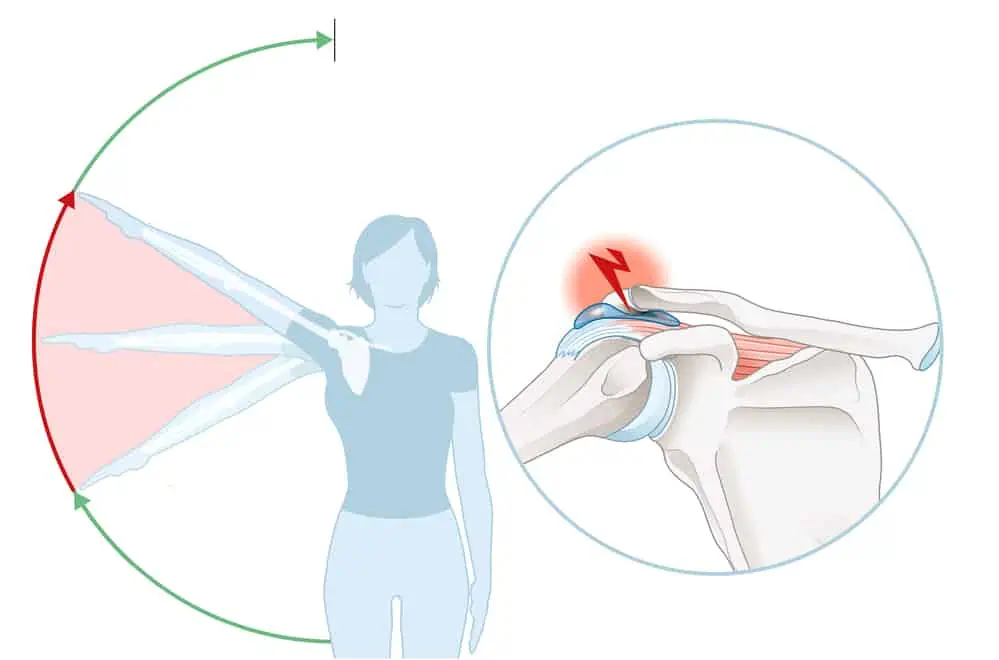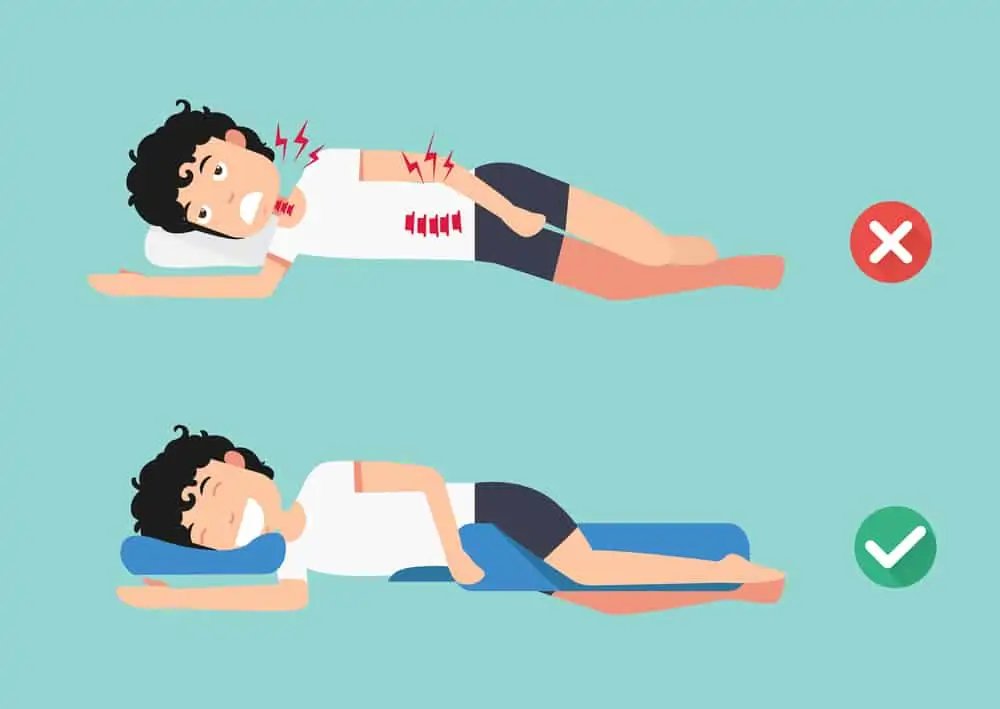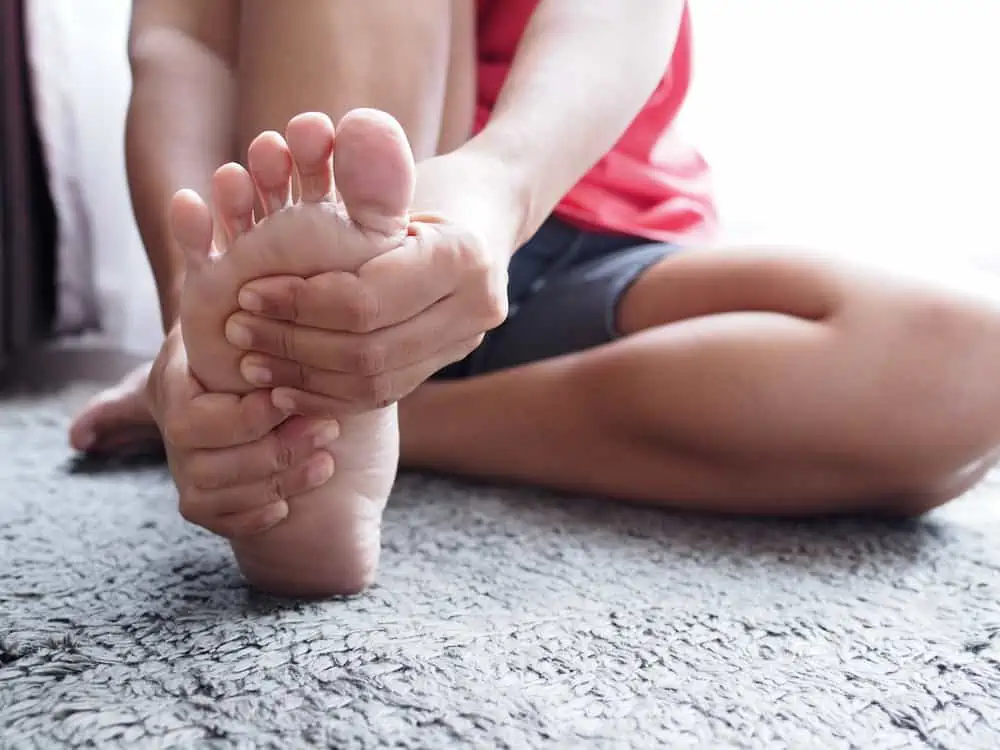This post may contain affiliate links. If you click through a link and make a purchase, I may receive a commission at no additional cost to you. As an Amazon Associate, I earn from qualifying purchases. Read the full disclosure here.
Trying to get a good night’s rest with shoulder pain is nearly impossible.
Whether you’ve had surgery, a rotator cuff injury, or a painful frozen shoulder, finding that just-right position to catch some Z’s is a challenge you have little patience for at 2 am.
Fast forward to morning, and now you’re cranky, tired, AND in pain.
You’re in luck. In this article, I’ll offer some of the best sleeping positions, plus other tips for how to relieve rotator cuff pain at night to help you get some much-needed rest.
Disclaimer: This content is for educational purposes and is not medical advice. Read the full disclaimer.
What is the rotator cuff?
The rotator cuff is four separate muscles; supraspinatus, infraspinatus, subscapularis, and teres minor.
This group forms the innermost layer of muscular stability for the shoulder and helps with rotational movements and fine-tuning the three-dimensional movements of the shoulder.
Supraspinatus assists with the initial lifting of the humerus (upper arm bone) into abduction to prevent the top of the bone from colliding with the acromion. Supraspinatus is most commonly involved in rotator cuff tendonitis/pain due to its location and function.
The other three rotator cuff muscles perform internal and external rotation motions.

Common causes of shoulder pain
- Shoulder bursitis
- Shoulder impingement syndrome
- Rotator cuff pain (tendonitis or rotator cuff tear)
- Frozen shoulder
- Referred pain from the neck
- Chronic pain
- Pain after rotator cuff surgery
Why is sleeping so difficult with shoulder pain?
The shoulder joint is one of the most mobile joints in the body, this freedom of movement allows us to perform everyday and recreational activities. But that extra mobility comes at some cost, in this case, stability, making the shoulder more vulnerable to injury.
When you have a shoulder problem, it seems to make every little tiny tweak send pain your way. Coupled with not moving for several hours at a time, you’ve got a recipe for pain.
Studies have predicted there is a reciprocal relationship between sleep and pain. The less quality sleep you get, the harder it is for the body to heal. Sleep deprivation plus pain is a very irritating combination.
Related read: How To Fix Neck Pain From Sleeping Wrong
Best sleeping positions for a shoulder injury
Try these variations to get more good quality rest as you heal.
Sleeping on your back
Use a supportive pillow to comfortably align your head and neck to decrease muscle strain or referred pain from the neck aggravating the shoulder.
Try a contour pillow or cervical pillow to help support the neck’s natural curve and keep the spine in line.
If you don’t want to get a new pillow, you can look into the McKenzie original cervical roll, which is a small roll that inserts into your pillowcase and helps turn an existing pillow into one with neck support. I also like this memory foam cervical roll if you’re looking for a bit more support.
Resting your hands on your abdomen or alongside your body may be a comfortable position for the shoulder. Alternatively, you can elevate your arm a few inches with another pillow to support the joint and alleviate shoulder pain.
If the idea of lying flat doesn’t work for you, you can always try elevating your head and shoulders with a sleeping wedge.
Sleeping on your side
For side sleepers, ensuring you have a high enough pillow to support the space between the shoulder and neck is essential in finding comfort. This square pillow for side sleepers looks boxy, but can provide incredible comfort for a side sleeper to avoid waking up with a crick in the neck.
Avoid sleeping on the injured shoulder. Hugging another pillow against the chest may be comfortable to support the upper arm.
Avoid sleeping on your stomach
Stomach sleepers are at a disadvantage. Stomach sleeping, especially with your hands overhead, will likely increase your shoulder pain and also cause neck pain.
How to relieve rotator cuff pain at night
Try these variations to get a good night’s sleep with less pain.
Start with a supportive pillow
Surprise, it’s all connected. Spinal alignment has a big effect on where your shoulder sits at night.
If your head and neck aren’t adequately supported and your neck is crunched up like a sardine, you can best believe your shoulder is going to feel it too, including that deep achy shoulder blade pain.
Memory foam pillows will hold their shape during the night. Feather or fill pillows may be molded to your exact shape but may need to be repositioned throughout the night as they shift.
Finding your best pillow may take some trial and error, but here are some basics to consider.
If you’re a back sleeper, try a contour pillow or cervical pillow to help support the neck’s natural curve and keep the spine in line.
I’m a big fan of the Tempurpedic ergo-neck pillow because they come in different sizes (because people come in different sizes).
If you don’t want to get a new pillow, you can look into the McKenzie original cervical roll, which is a small roll that inserts into your pillowcase and helps turn an existing pillow into one with neck support. I also like this memory foam cervical roll if you’re looking for a bit more support.
If you’re a side sleeper, a slightly higher pillow can give room for your shoulder without collapsing into the bed and keep your head in line.
Here are some side sleeper pillows to try available on Amazon:
- Dafeel cooling pillow for back, side, and stomach sleepers
- Sidney side sleeper neck pillow
- Dreamy Blue pillow with shredded memory foam

Take a look at your mattress
A good mattress should also support the natural curves of your spine and helps with low back pain and hip pain.
Too firm or too squishy could be uncomfortable. Unfortunately, your best mattress is a personal decision. Good quality mattresses are becoming much more affordable.
In the absence of buying a whole new mattress, you could try rotating your mattress or using a memory foam mattress topper for additional support and comfort.
When choosing a mattress, airing on the side of firm allows for more options. You can always add a topper to make a mattress softer, but you can’t make a softer mattress more firm.
“Firmness” can also vary between companies, so if you are able to try or at least have a trial period, that’s a plus.
When ordering a mattress from the internet, look for options that allow a full refund or exchange after trying if it’s not the right one for you.
Try a very small support pillow under your shoulder
If you’re a back sleeper, there may be an uncomfortable space between your painful shoulder and the mattress, creating a deep painful ache as your shoulder hovers without adequate support.
A full pillow will pitch your shoulder up too high, resulting in the same pain when you finally wake up. However, a very small pillow or rolled blanket to simply take up the space and provide gentle support may help you sleep more comfortably.
Elevate your elbow and wrist with a pillow
Again for back sleepers, using a pillow to elevate the lower half of the arm can also take some pressure away from your sore shoulder.
The ProRest arm pillow has a divot in the center to keep your arm in place and helps support the weight of your arm.
The Arm Elevation Pillow can help keep your shoulder even more supported if you’re looking for a bit more elevation.
Try a body pillow
For side sleepers, the affected shoulder is usually not an option for sleeping, so you’re only left with one other choice.
But how do you support your painful shoulder while lying on the side?
Try hugging a pillow into your chest, or better yet, a fluffy body pillow for support. Body pillows provide some additional space so that your arm isn’t glued to your side all night.
Elevate yourself with a sleeping wedge
Sleeping wedges can help change the angle and strain on your shoulder without compromising neck alignment to improve comfort.
If you’re a back sleeper, a standard wedge might do the trick. Wedges come at different angles, so it depends on how high you want to be pitched.
If you’re a side sleeper, the MedCline shoulder relief wedge and body pillow system is a unique answer to this problem.
This pillow wedge provides a movable body pillow, plus a cut-out in the wedge to allow your arm to go through the wedge. This thoughtful design may allow you to sleep on your affected shoulder and provide some welcome pain relief.
If you’ve recently had shoulder surgery, check with your doctor first. Also, If there are any sleep apnea concerns, a wedge can be a safer option than lying flat.
Is sleeping with hands behind the head bad?
Not necessarily.
Depending on your specific cause of shoulder pain, this sleep option may be viable, but it likely won’t be comfortable for several hours.
It’s also possible that you’ll start to experience some numbness and tingling in the lower arms or fingers with tension on the ulnar nerve.
But I still have shoulder pain when I wake up?!
Pain and stiffness when you first wake up are par for the course with any injury because of the amount of time spent lying still.
These options aim to lessen the severity of pain during the night and in the morning, as well as reduce the number of times your sleep is disrupted due to pain.
If you’re allowed to do gentle movement (check with your doctor if you’ve recently had surgery) heading straight to your set of shoulder pulleys for a few minutes can help loosen things back up and work out the morning kinks.
Be sure and get an evaluation by a physical therapist for more exercises and recommendations specific to your condition.
Related read: How To Ease Shoulder Impingement Pain
Wrapping up
Don’t let shoulder pain keep you from a restful night’s sleep.
Use these tips to make yourself more comfortable and promote healing. The best sleeping position for your rotator cuff problem will be individual.
Don’t forget to head to physical therapy to start healing your shoulder pain!
References
Aili K, Nyman T, Svartengren M, Hillert L. Sleep as a predictive factor for the onset and resolution of multi-site pain: a 5-year prospective study. Eur J Pain. 2015;19(3):341-349. doi:10.1002/ejp.552
Zenian J. Sleep position and shoulder pain. Med Hypotheses. 2010 Apr;74(4):639-43. doi: 10.1016/j.mehy.2009.11.013. Epub 2009 Dec 24. PMID: 20036076.






